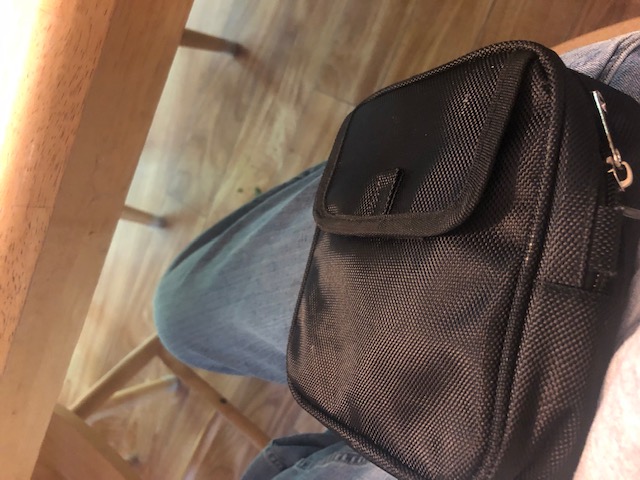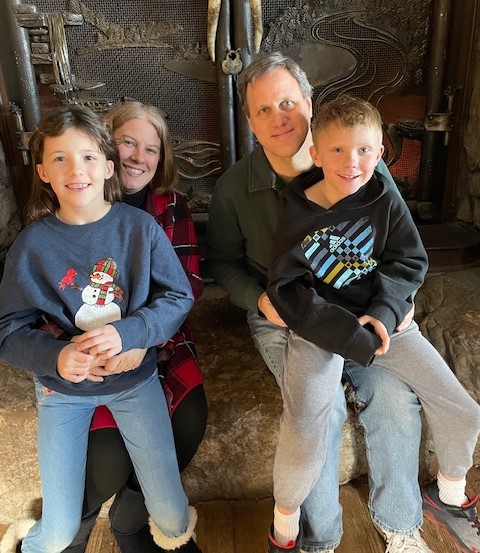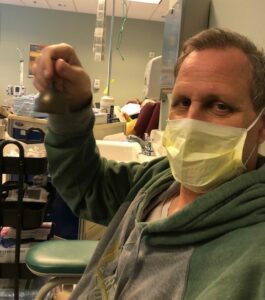Overcoming Powerlessness
A cancer survivor shares more about how he conquered fear and feeling powerless.

Our two children played upstairs while I sat on the couch exhausted. The seven-month emotional rollercoaster of facing cancer had taken its toll.
“I can’t go on. It’s too much,” I told my wife with my hands over my face. “I don’t know. I don’t know. . .” My chemo brain wouldn’t let me get the words out. “I’m. . . I’m . . .”
Through the tears, I looked up.
Krista, my wife, gazed into my eyes, “Honey, you are feeling powerless.”
She said the word I didn’t want to utter—powerlessness.
Defining Powerlessness
As a licensed professional counselor, one of the main themes I explore is the experience of powerlessness in a person’s life story.
Powerlessness is defined, though more complex, as a state of being trapped, threatened, or weakened by something greater than oneself. The circumstance, person, or inner turmoil endangers the soul’s safety towards hopelessness.
That’s certainly what I felt when I was diagnosed with stage three rectal cancer in September of 2021.
An alarming discovery
The doctors discovered a four-inch cancerous mass that had metastasized into many lymph nodes in the left rectum wall. I had a 50/50 chance of it staying local or spreading to other organs. If the cancer spread, I would be terminal.
I received twenty-five radiation treatments in five weeks. I also had eight rounds of intravenous chemotherapy. This entailed six hours of treatment along with a chemotherapy bag that dripped medicine into my veins for forty-six hours.
I experienced extreme constipation and pain followed by chills, muscle spasms, weight loss (44 pounds), and fatigue. The pain was great, the exhaustion was greater. I was depleted emotionally, spiritually, physically, and psychologically. Powerless!

Backstory of powerlessness
Facing cancer was not the only time I have felt powerless.
I vividly remember when my brother, David, dared me to slide down the laundry chute into the basement basket. At four years old and not knowing any better, I went down curled up. I got stuck in the curve at the end. My little head hung out of the opening as my body was trapped inside the metal tube.
David tried to pull me out and then my mother did too. The more I struggled, the worse it got. I hopelessly and tearfully panicked. Eventually, they called the paramedics, who used butter to slide me out of the chute. Now a funny story this picture of powerlessness is seared in my memory.
Over the years, I struggled with other powerlessness from life adversities—childhood pain, adult insecurities, relational betrayals, etc. As I matured, I thought I finally knew my enemy.
Then cancer hit. I now wrestled with my “chute” on a deeper level—physical pain, emotional confusion, depression, and possible death.
How I find hope, strength, and peace against cancer
When I live in humility, obedience, and surrender, I enter a greater narrative of God’s design.
God is sovereign—He powerfully is in control of my life. I am his beloved child, and He won’t let me go. This perspective gives me peace. Furthermore, I had an inner strength because my sufferings now will mature me, both in the present and the future.
Pain is often God’s instrument of grace to grow us into the person we need to become. This truth produces hope. Hope does not disappoint because there is a greater story being written. Life is not about me. It is living and loving beyond me—an eternal perspective. I would either be healed in heaven to be with My Savior, Jesus, or I would be transformed here on earth.
Either way, God uses my suffering for good and his glory.
Two wrong approaches to powerlessness
When we feel powerless, our self-protection displays itself in two mentalities: the victim guy or the tough guy (or girl).
As the victim guy, I believe that everyone is against me. I say, “Woe is me. Nobody wants me.” I don’t take responsibility and blame others for my issues. I become cynical of myself and others which leads to depression. As a result, my life has no meaning except survival. My victim mentality sabotages faith.
As the tough guy, I am fixated on overcoming the issues alone. I say, “I don’t need you. I’m on my own.” If anyone is in my way, I become stubborn, inflexible, and contemptuous. As a result, my character develops into independent arrogance. My self-absorption devours love.
Three friends who walk along the road
I believe there is a better way, that there are three friends who want to help us on the road of suffering. Their names are humility, obedience, and surrender.
Humility means I have an awareness greater than myself. I don’t lean on my understanding, competency, or desires. I love, think, and endeavor to put others first and continue to love even if my care involves personal suffering.
Obedience means listening to an authority greater than myself. I trust God and sometimes the wisdom of other people even if their instructions hurt me in the moment.
Surrender means releasing my desired outcome for something greater than myself. I find the reward of blessings even if they do not come in the now.

A big decision
Each treatment had ravished my body. When I got to the last one, I didn’t want to do it. My oncologist encouraged me to finish the chemotherapy treatments. But it was my choice.
As I waited for my blood work results, I wrestled with God about my decision. “Do I truly believe that You are in control? Do I completely believe that You placed these people in my story to provide me with this care? Am I willing to suffer again and become more powerless?”
My blood work came back well enough to proceed with my last dosage. The nurse asked, “Do you want your last one?”
My thoughts raced to my children, and my wife’s gaze, “Now is the time to trust,” my heart whispered. Then I said, “Let’s do it.”
I chose more suffering.

Where I’m at now
After my surgery, my doctor stated, “You had the right amount of chemotherapy for me to get all the cancer.”
And now more than 2.5 years later, I am cancer-free and in remission.
My suffering choice gave me life. I’m so grateful and I want others to find hope from my story.
Advice for others
Surrender to the process. The journey can be gut-wrenching, long, and hard; however, there is a way to walk down the road.
Listen to your doctors’ wisdom. Trust God’s sovereignty in your suffering. Give your loved ones the privilege to be on the journey with you.
Don’t fall into the trap of being powerless by the victim guy or living as the tough guy (or girl). Also, don’t live in despair or try to do this on your own. Allow someone to gaze into your soul, search into you, and find those treasured words within you.
Humility, obedience, and surrender are friends—the best of friends—to journey with you toward hope’s destination: faith and love.
For more about how to begin a relationship with God see Knowing God Personally.
To unlock the power of prayer see Asking God for Help.
For a 7-day email series on finding hope against cancer, see The Pathway to Hope.
I have a question or comment
How to find God’s hope, strength and peace

